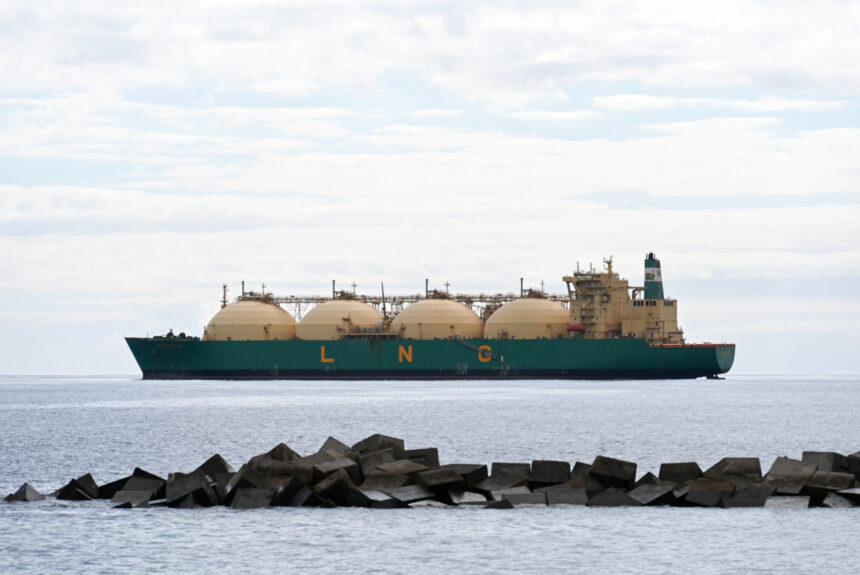One of the Biden administration’s alleged justifications for its February pause of liquified natural gas (LNG) exports was that Europe would be well supplied and the concern of overbuilding capacity in the United States. A new study projects the opposite, estimating there will be a global LNG shortfall if the federal government fails to approve new projects.
>>>READ: Oil and Gas Aims to Boost Productivity, Reduce Emissions
According to research from the Energy Policy Research Foundation, the global LNG shortfall could be as high as 18 billion cubic feet per day (Bcfd) by 2040, which assumes 3 billion Bcfd of Russian gas remains operational. That shortfall represents roughly 23 percent of the projected global demand of 79 Bcfd. Even under the assumption of a massive clean energy buildout, the projected shortfall could still be 5 Bcfd in 2040.
The administration’s insistence on holding up LNG exports has benefitted other suppliers, primarily Qatar. As a result, American suppliers could lose out on valuable economic opportunities. The longer the Department of Energy studies whether additional LNG exports are in the public’s national interest, the more damage the agency inflicts to America’s reputation as a secure, reliable energy ally.
In a new white paper, C3 Solutions makes the economic, environmental, and national security case for expanding LNG exports. America’s rise as the top LNG exporter reduces dependence on adversarial nations and diversifies global energy supplies. European dependence on Russian natural gas has been a strategic vulnerability, but the U.S. has stepped up to fill that gap. In 2023, two-thirds of U.S. LNG exports went to Europe, helping lower energy prices and build up gas inventories quicker than expected.
The G7’s April 2024 Climate, Energy, and Environment Ministers’ Meeting Communiqué emphasized the critical role of LNG in restricting Russian energy revenues. This underscores the strategic importance of U.S. LNG exports in the broader geopolitical landscape. On a recent visit to Washington, D.C., Maros Sefcovic, Executive Vice President of the European Commission, put it simply: “The U.S. is now the guarantor of global energy security.” Regrettably, the administration’s pause is threatening that guarantee.
The administration’s other justifications for studying additional LNG export approvals are also dubious. When pausing the exports, the administration said it would review pending applications on their environmental and climate impacts as well as their price effects on domestic energy consumers and manufacturers.
However, several analyses have shown that LNG exports are cleaner than other forms of energy. A 2019 Department of Energy (DOE) analysis found that LNG exports could have lifecycle emissions up to 56% less than coal if exported to Europe. When compared to Russian-piped gas, U.S. LNG is 41% cleaner. Thus, the climate benefits of natural gas are clear, even when accounting for fugitive methane emissions.
Regarding the price impact of expanded LNG exports to domestic consumers, it is important to understand the complexity of the market. While increased demand could drive up prices, higher prices would incentivize more production. Technological advancements continue to make the extraction of natural gas more efficient and economically viable, even at lower prices.
>>>READ: Don’t Make LNG Exports the Next Keystone XL
Analyses have indicated that increased LNG exports have had minimal impacts on domestic prices. A March 2024 Energy Ventures analysis showed that despite record levels of LNG exports, the six-month average of Henry Hub natural gas prices at the beginning of 2023 was the lowest in 35 years. The lengthy construction times and long-term financing and contract structures of LNG projects allow the market to adjust before new supply reaches the market. It is also worth noting that the 2019 DOE study said the net economic benefits would exceed any economic costs – and this held true in the case of unlimited LNG exports versus limited ones.
More fundamentally, the market – not federal bureaucrats – should determine the level of LNG trade. The federal government does not own natural gas. Unless there is a national security concern, U.S. companies should be able to freely trade goods around the world and that includes energy. The government should not limit natural gas exports any more than it should limit exports of cars, clothes, or corn. If energy companies make bad bets and overbuild, the loss is on them. If companies cannot capitalize on market opportunities because of bad public policy, the loss will still be on the companies but the fault is with the administration.
The Biden administration’s pause on LNG export projects is a misstep that threatens to undermine economic growth, environmental progress, and national security. It is time for the administration to press unpause on LNG exports and restore confidence in the market and America’s allies that we are a secure, reliable energy trading partner.
C3’s full paper, LNG Exports: The Economic, Environmental and National Security Trifecta, can be found here.
The views and opinions expressed are those of the author’s and do not necessarily reflect the official policy or position of C3.
